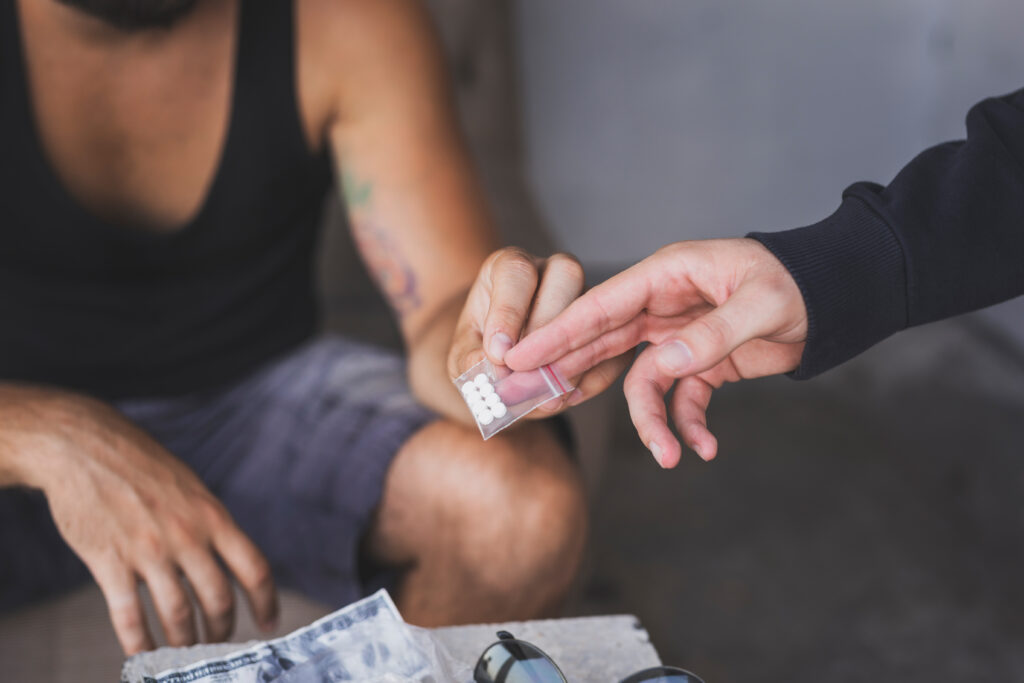Attorney Bradley has handled hundreds of drug-related cases ranging from simple possession to trafficking in controlled substances. If you or someone you know has been charged with a drug-related offense, contact Attorney Bradley for a free consultation today.
In Massachusetts, drug crimes are prosecuted severely by law enforcement and District Attorneys. Due to a continual increase in drug-related crimes, the state and federal government have adopted firmer drug laws and legal punishments.
Drug crimes are very serious in nature and should never be taken lightly. A person who is charged with a drug crime faces life-changing legal consequences.
Drug Possession:
Having one or more illegal narcotics in one’s possession for personal use or for sale.
Anyone who possesses an illegal drug can be sentenced to jail for 2 years for a first offense and/or be fined up to $2,000.
Drug Possession with the Intent to Distribute:
Having one or more illegal narcotics in one’s possession with the intention of selling the narcotics. The penalty can include a 2 1/2 year sentence in a House of Correction or County Jail, or an even longer sentence in state prison, depending on the class of drug involved and the amount.
Drug Manufacturing:
The act of producing unlawful controlled substances.
Drug Distribution:
Smuggling, transporting, or delivering illegal narcotics.
Conspiracy to Violate Drug Laws:
Conspiracy is an agreement to accomplish a criminal offense, or to accomplish a lawful objective by criminal means. Conspiracy to ‘violate the drug laws’ is the Commonwealth’s way of alleging a conspiracy between two or more people to engage in the act of possessing or selling drugs.
Drug Trafficking:
Trafficking is the most serious of all Massachusetts drug crimes. In Massachusetts, any drug trafficking conviction carries a mandatory minimum state prison sentence that must be served before parole is possible.
Drug trafficking is the possession with the intent to distribute or the actual distribution of a certain threshold quantity of drugs.
Marijuana Trafficking:
- A conviction of trafficking 50 pounds or more you face 2 1/2 to 15 years in state prison or 1 to 2 1/2 years in house of correction. A conviction carries a minimum mandatory 1-year sentence.
- A conviction of trafficking 100 pounds but less than 2000 pounds you face 3 to 15 years in state prison. There is a minimum mandatory 3-year sentence to be served.
- A conviction of 2000 pounds and less than 10,000 pounds the sentence can range from 5 to 15 years in state prison. The minimum mandatory sentence is 5 years.
If convicted of trafficking 10,000 pounds or more the sentence ranges from 10-15 years. The minimum mandatory sentence is 10 years.
Cocaine Trafficking:
Trafficking in Cocaine (Class B) is considered more serious than marijuana trafficking.
IF YOU ARE CONVICTED OF COCAINE TRAFFICKING YOU CAN BE SENTENCED AS FOLLOWS:
- 14 grams but less than 28 grams provides for 3 to 15 years in state prison. The minimum mandatory sentence you must serve is 3 years.
- 28 grams but less than 100 grams provides for a 5 to 20-year prison sentence. 5 years of this sentence is a minimum mandatory that must be served.
- 100 grams but less than 200 grams has a prison sentence that ranges from 10 to 20 years. 10 years of this sentence is a minimum mandatory.
- 200 grams or more requires a sentence of 15-20 years. The minimum mandatory is 15 years.
Heroin Trafficking:
Trafficking in Heroin (Class A) is treated as the most severely of all trafficking crimes in Massachusetts.
IF YOU ARE CONVICTED OF TRAFFICKING IN HEROIN YOU CAN BE SENTENCED AS FOLLOWS:
- 14 grams but less than 28 grams requires a mandatory minimum 5-year sentence. The maximum is 20 years.
- 28 grams but less than 100 grams requires a mandatory minimum 7-year prison sentence. The maximum is 20 years.
- 100 grams but less than 200 grams requires a mandatory minimum 10-year prison sentence. The maximum is 20 years.
- 200 grams requires a mandatory minimum 15-year prison sentence. The maximum is 20 years.
SCHOOL ZONE:
Any time a person is arrested for Possession With Intent To Distribute, and the offense took place within either 1000 feet of a school or 100 feet of a playground or park, it is considered to be within a school zone and the offender is subjected to severe criminal penalties.
The prosecution doesn’t even need to prove that the defendant intentionally meant to distribute illegal drugs within the school zone, to get a conviction.
All they need to show is that the defendant did in fact possess a controlled substance within 1000 feet of a school or 100 feet of a park or playground, and that he/she had the intent to distribute the controlled substance(s) somewhere, to anyone.
When someone is charged with a drug violation in a school zone, the penalty for the school zone violation includes a mandatory minimum of two years, which must be imposed from-and-after the punishment for the underlying offense.
A defendant who has been convicted of a school zone drug violation will be sentenced to state prison for a term of anywhere from a minimum of 2 1/2 years to a maximum of 15 years, or alternatively to a County Jail/House of Correction for a minimum term of 2 1/2 years. Under all circumstances following a guilty verdict, there is a mandatory minimum prison or jail sentence of 2 years.
DRUG CRIMES DEFENSE IN MASSACHUSETTS
If you have been charged with a drug crime in Massachusetts, contact us for a free case evaluation. With law offices in Quincy and Norwell Massachusetts, drug and criminal defense attorney Michael Bradley serves Suffolk County, Norfolk County, Plymouth County, Bristol County, Cape Cod, and the South Coast including Braintree, Boston, Brockton, Dedham, Fall River, New Bedford, Plymouth, Quincy, Taunton, Wareham, Weymouth and more.



